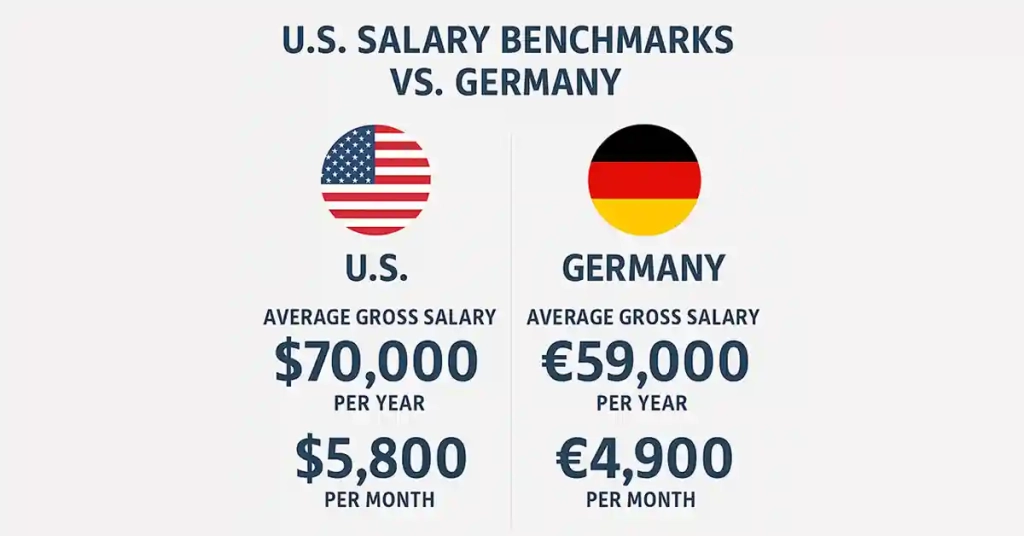Germany vs USA Salaries: The Ultimate Guide for Expats, Workers, and Global Professionals
- Germany vs USA Salaries: The Ultimate Guide for Expats, Workers, and Global Professionals
- Average Gross Salary in Germany vs the US
- Net Salary: What You Actually Take Home
- Cost of Living Differences: US vs Germany
- Salaries by Profession: Where Are the Highest Payouts?
- Salary Negotiation Culture: Germany vs United States
- Vacation and Work Life Balance: Who Gives You More Time Off?
- Gender Pay Gap and Diversity Dynamics
- Which Country Is Better for Expats?
- FAQ:
When considering a career move or evaluating job offers across borders, salary is often the first—and most decisive—factor professionals assess. But the truth is, how much you earn is only part of the story. What truly matters is how much you keep after taxes, how far that income goes, and what protections come with it.
Germany and the United States are both global economic leaders, yet their approaches to income, taxation, worker benefits, and living expenses couldn’t be more different. On paper, U.S. salaries often appear more generous.
For example, the average monthly net salary in the U.S. is around $4,000, while Germany’s average monthly net salary is closer to €2,850, which is approximately $3,060 USD. That’s a difference of about $940 per month in favor of the U.S.—but the picture changes quickly when factoring in the cost of healthcare, paid vacation, rent, and job security.
In the U.S., a higher paycheck may come with no paid vacation, costly private health insurance, and minimal job protections. In contrast, Germany offers extensive public benefits, including universal healthcare, long paid leave, and strong employee rights, making even a smaller paycheck stretch much further.
Germany vs USA Salaries – Key Differences at a Glance
| Category | Germany | USA |
|---|---|---|
| Avg Gross Salary | €59,000/year | $70,000/year |
| Avg Net Salary | €2,850/month | $4,000/month |
| Tax Burden | High but structured (social benefits included) | Moderate to high (varies by state) |
| Healthcare | Public, universal, included in salary | Mostly private, often expensive |
| Paid Vacation | 20–30 days + holidays | 10–14 days (not guaranteed) |
| Job Security | Strong, legally protected | Low, “at-will” employment |
| Living Costs | Predictable, subsidized essentials | Highly variable, especially housing |
| Best For | Stability, family life, long-term security | Fast growth, higher pay, entrepreneurial |
| Work-Life Balance | Protected time off, clear boundaries | Often blurred, culture of overwork |
This comprehensive guide uncovers the key Germany vs USA salaries differences—digging deeper into not just what you earn, but what that income really delivers. From gross and net pay to taxes, living expenses, work culture, and vacation entitlements, this side-by-side comparison is built to help expats, international professionals, and globally mobile students make smarter decisions.
For anyone weighing their next big move, this isn’t just a numbers game—it’s a real-world insight into what it means to live and work on either side of the Atlantic.
FUN FACT
Paid Parental Leaves in Germany
Unlike the U.S., where paid parental leave depends on the employer, Germany allows new parents to split up to 14 months of paid parental leave with state support. It’s one of the most generous systems in the developed world.
Average Gross Salary in Germany vs the US
Germany’s Income Landscape
The average salary in Germany for full-time employee is just under €5,000 monthly in gross salary when bonuses are included. However, the more realistic figure used for monthly budgeting is about €4,479 before deductions. The median gross salary is around €4,323 per month, meaning half of all workers earn less.
Wages in Germany are highly structured and linked to job type, region, education, and company size. Sectors like tech, finance, and engineering lead in compensation, while public sector jobs, healthcare, and education trail behind.
US Salary Benchmarks
In the United States, average gross income is higher on paper—ranging between $65,000 and $75,000 annually. That translates to $5,400–$6,250 monthly before taxes. Salaries in major cities and certain industries (tech, law, medicine) can significantly exceed the national average, especially in hubs like San Francisco or New York.
When comparing Germany vs USA salaries, it’s clear that the U.S. often starts higher in gross pay, but Germany compensates with long-term benefits and protections that soften the impact of lower headline earnings.
Net Salary: What You Actually Take Home
Germany’s Deduction System
A high percentage of German income is allocated to taxes and social security. Deductions include income tax, solidarity surcharge, church tax (where applicable), and social security contributions totaling about 20–22% of gross income.
After all deductions, the average take-home pay is about €2,850 per month. However, this includes full healthcare, pension, unemployment, and long-term care coverage, which are major advantages when comparing Germany vs USA salaries for long-term financial planning.

U.S. Taxation and Insurance
Deductions include federal and state income tax, Social Security, Medicare, and optional retirement contributions. Private healthcare premiums can add up to $1,000 or more monthly if not covered by the employer.
Despite often appearing higher on paper, U.S. net salaries are subject to far more personal financial responsibilities—something frequently overlooked when analyzing Germany vs USA salaries.
Cost of Living Differences: US vs Germany
Monthly Expenses in Germany
Germany offers a balanced lifestyle with predictable costs. Major cities are expensive, but healthcare and public services reduce the financial pressure. The gap between income and expenses is narrowing, yet still manageable with a full-time salary.
Living Costs in the US
In the U.S., expenses vary drastically depending on location and health coverage. Housing costs alone can consume over 50% of net income in top-tier cities.
From a budgeting perspective, Germany vs USA salaries analysis should always factor in how much of the income goes to unavoidable life essentials like rent, food, transport, and insurance. Germany usually wins in affordability for essential services.
Salaries by Profession: Where Are the Highest Payouts?
Tech & IT Jobs
The tech sector shows the starkest Germany vs USA salaries contrast. U.S. engineers often earn nearly double, especially with stock options and bonuses. However, job security and burnout are major concerns in the American tech culture.
Engineering Roles
Engineering salaries are consistently higher in the U.S., but not all fields justify the additional living costs and student debt. Germany, with its affordable education and regulated industries, offers a better return for engineers building long-term careers.
Healthcare Professionals
The U.S. healthcare sector is highly lucrative but also expensive to enter and operate within. In contrast, Germany offers lower salaries but fewer financial risks, particularly when it comes to malpractice insurance and licensing costs.
Understanding Germany vs USA salaries in healthcare must consider not just income, but also the structural burdens attached to the profession in each country.
FUN FACT
U.S. Engineers Earn Double
U.S. software engineers—especially in top companies—can earn almost twice as much as their German counterparts. However, that higher salary often comes with no paid vacation and expensive health insurance, unlike in Germany where these are standard benefits.
Salary Negotiation Culture: Germany vs United States
How Salaries Are Negotiated in Germany
German salary negotiations are subtle. Offers are based on collective agreements and internal pay bands. There is room for negotiation, but expectations must be realistic. Bringing up the topic too soon in interviews is often frowned upon.
For expats, it’s critical to research local benchmarks. Presenting a solid business case backed by German market data can shift the needle slightly. However, don’t expect aggressive negotiation tactics to be well received.
Negotiating in the U.S.
In contrast, the U.S. sees negotiation as a standard part of the hiring process. Employers anticipate counteroffers. Expats who fail to negotiate may be seen as less confident or unaware of market dynamics.
A skilled professional in either country can navigate this, but Germany vs USA salaries are as much about negotiation culture as they are ab
out raw numbers. Leverage works differently, and understanding that cultural nuance is essential.
Vacation and Work Life Balance: Who Gives You More Time Off?
Paid Vacation in Germany
Germany provides some of the most generous vacation and leave policies in the world. Beyond the legal minimum of 20 paid days (often increased to 25 or 30 by employers), workers enjoy public holidays, paid sick leave, and up to 14 months of parental leave.
Time off is protected and respected. You’re not expected to be “available” on vacation. This directly impacts the value of Germany vs USA salaries, where quality of life matters just as much as monthly paychecks.
Vacation in the United States
In the U.S., most employees get 10 to 14 vacation days—if that. Many workplaces remain open during public holidays, and being reachable during time off is culturally expected in many sectors.
Comparing Germany vs USA salaries without accounting for the stark difference in vacation and work-life balance creates a misleading financial picture. What looks better on paper in the U.S. may come at a high emotional and physical cost.
Gender Pay Gap and Diversity Dynamics
Despite differences in workplace culture, both countries continue to face challenges around gender pay equity. In Germany, women earn notably less and are underrepresented in leadership. In the U.S., while representation is improving, wage gaps remain across industries.
The nuanced reality is that Germany vs USA salaries for women and minorities often come with additional barriers—both structural and cultural. Progressive employers in both countries are working to close these gaps, but progress is uneven.
FUN FACT
Fired Easily? Not in Germany
In the U.S., most employees can be fired at any time without a specific reason under “at-will employment.” In Germany, once you pass probation, terminating an employee requires legal justification and is often difficult, even in cases of underperformance.
Which Country Is Better for Expats?
Germany: Predictability and Protections
With free healthcare, job security, and generous leave policies, Germany offers peace of mind. It’s ideal for expats with families, those seeking long-term residence, or anyone valuing personal time.
United States: Opportunity and Earnings Potential
The U.S. is attractive for high-performing professionals in competitive industries. There’s more room for financial growth—but also more personal financial risk.
When evaluating Germany vs USA salaries, expats must decide whether they prioritize short-term earning power or long-term lifestyle and security.
Which Country Supports Your Long-Term Goals?
Choosing where to work is never just about the paycheck. It’s about how much of your income you keep, the benefits tied to your job, and how your working environment supports your financial and personal future. Germany vs USA salaries reveal not just monetary differences, but fundamentally different approaches to employment, accountability, and lifestyle.
Germany offers a highly structured system where employee rights are protected by robust labor laws. After the probation period, dismissing an employee can be legally challenging—even in cases of repeated underperformance. The intent is to promote job stability, but in some work environments, it may lead to slower responses to internal inefficiency or misconduct.
In contrast, the United States follows an “at-will” employment model, where employers can terminate contracts with far fewer legal hurdles. This creates a performance-focused atmosphere, where employees often work with heightened awareness of their responsibilities and the consequences of their output.
Here’s how these systems compare in key areas:
- Job security:
- Germany provides long-term security, especially for full-time employees in larger companies.
- The U.S. offers less protection, but faster access to opportunity and performance-based rewards.
- Accountability culture:
- U.S. employees often carry a stronger sense of urgency and individual responsibility, driven by direct consequences.
- In Germany, accountability can be tempered by procedural protections, particularly in traditional or bureaucratic sectors.
- Business agility:
- U.S. companies can adapt quickly, restructure when needed, and make hiring or firing decisions based on real-time performance.
- German companies are more constrained by employee protections but may benefit from greater workforce retention and experience continuity.
Despite their differences, both systems succeed on their own terms. Germany excels at providing a safety net and long-term predictability, ideal for those who prioritize stability, work-life balance, and protection against unforeseen challenges like illness or unemployment
It’s particularly appealing for professionals who value time off, structured roles, and strong legal support in employment.
However, Germany’s increasingly relaxed work ethic is becoming a challenge for companies, industries, and the economy as a whole. It also places pressure on high-performing individuals within organizations, who may carry a disproportionate workload due to unequal motivation and engagement levels among colleagues.
The U.S., meanwhile, rewards drive, initiative, and output. For professionals early in their careers or looking to accelerate their growth quickly, its flexible job market, competitive compensation in high-growth sectors, and performance-driven culture can be a launchpad to rapid advancement. The trade-off is reduced protection—but often, more room to rise.
Ultimately, Germany vs USA salaries are just one piece of a much bigger decision. The best salary isn’t necessarily the largest—it’s the one that aligns with your lifestyle, your ambitions, and the way you want to live and work.
Whether you’re looking for fast-paced opportunity or structured long-term support, knowing the real-world implications behind your paycheck is key to making the right move with confidence.
FAQ:
Are salaries higher in the USA or Germany?
Salaries are generally higher in the USA, especially in industries like tech and finance. However, Germany offers more social benefits, lower out-of-pocket costs, and better job security, which balances the value of earnings over time.
Is it better to work in the USA or Germany
It depends on your priorities. The USA offers faster salary growth and higher pay, while Germany provides stronger job protection, longer vacations, and publicly funded healthcare. For stability, Germany wins; for ambition and income, the USA leads.
Are Germans paid well?
Yes, Germans are paid fairly by European standards, especially in skilled jobs. While base salaries may be lower than in the USA, generous benefits like healthcare, vacation, and pensions add significant value to overall compensation.
Why are US salaries so much higher than Europe?
US salaries are higher due to fewer labor protections, limited public benefits, and a performance-driven job market. Employers must compensate for lack of public healthcare, shorter vacations, and weaker safety nets, inflating gross wages.
What is a good salary in the USA?
A good salary in the USA is typically around $75,000 per year. This allows for comfortable living in most cities, though higher incomes are often needed in expensive areas like New York or San Francisco to cover housing and healthcare costs.
Is it cheaper to live in Germany or the USA?
Germany is generally cheaper due to lower healthcare costs, affordable public services, and strong tenant protections. The USA has more income potential but significantly higher living expenses, especially in cities and for healthcare.
Which is more developed USA or Germany?
Both are highly developed, but in different ways. The USA leads in innovation and economic scale, while Germany excels in infrastructure, public services, and quality of life. Development depends on what metrics you’re comparing.
How informative was this article?
Click on a star to rate it!
We are sorry that this post was not useful for you!
Let us improve this post!
What is missing in the article?















